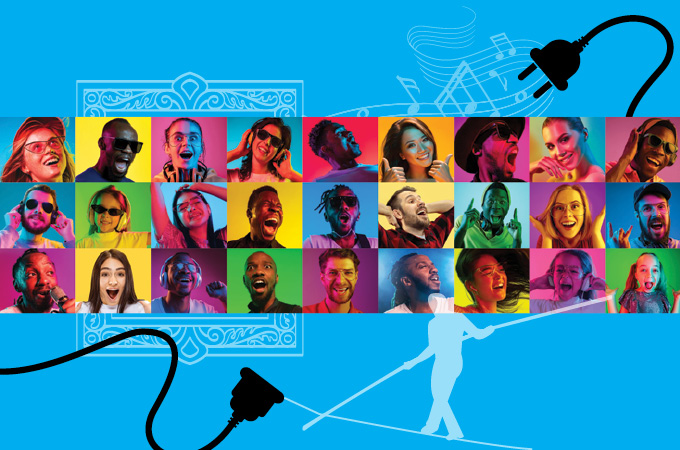From music and creative performances to literature and visual arts, St. Louis is lucky that so many cultural gems call the city home. When the shutdown introduced new restrictions this spring, many lost their main ways of engaging with the community, but thanks to creative thinking, they found innovative solutions to reach audiences. We talked with three local nonprofits to learn what they did to keep St. Louisans connected to culture.
circus harmony
For many, the pandemic has felt like walking a tightrope. Circus Harmony took that metaphor and brought it to life with a special program to help students manage their difficult feelings: The Balancing Act: Walking the Pandemic Tightrope. “The show is about finding balance in an unbalanced time,” executive director Jessica Hentoff says. “It started out centered around the pandemic but evolved to be about other issues like social justice and the election.” The nonprofit livestreamed the performance Oct. 10; it was viewed by audiences from 35 states and around the world.
This spring, Circus Harmony had to pull off its own balancing act in transitioning its circus arts training program from in-person to online. It offered virtual quarantine classes, which drew in students from St. Louis and beyond. “We learned that our students and coaches can be incredibly creative and innovative,” Hentoff notes. “ It’s really hard to imagine doing circus remotely because it’s such an in-person art form, but it’s also very adaptable.” In the summer, Circus Harmony was able to offer outdoor sessions at summer camps.
Classes usually are held at the City Museum, but Hentoff notes that the nature of the exercises and space available don’t allow for social distancing. Fall courses still are being offered virtually in monthly sessions. “We knew that whatever the situation was when we started, it could change at any time,” she says. “It’s good that we’ve been able to keep busy. When you’re walking a tightrope and feel like you might lose your balance, the most important thing is taking that next step forward.”
Visit circusharmony.org.
st. louis symphony orchestra
While live performances now have resumed at Powell Hall, the St. Louis Symphony Orchestra (SLSO) had to get creative when it came to connecting with audiences this spring and summer. To keep musicians and spectators safe, traditional concerts weren’t an option. President and CEO Marie-Hélène Bernard says communication with the community was key. “Our mission is to enrich lives through access to music, and we had to find new ways to connect people with our performances and resources,” she notes.
One area the symphony initially focused on was reaching families and students to ensure they still could access music programming. “We had an existing foundation and platform for online educational resources,” Bernard says. “With parents moderating children’s learning at home, we wanted to help ensure music continued to be a part of that education.” Programs were revised to better fit an online environment, and more content was added to its website.
SLSO also continued to bring performances to patrons at home. It used community partnerships, such as with Nine Network and St. Louis Public Radio, to present previously recorded concerts and new content. This summer, it released Songs of America, a performance series that spotlighted local musicians. “The series received thousands of views, more people than we can bring into Powell Hall for a performance,” Bernard notes. “We are grateful for people’s support and that we were able to build new relationships. We want people to know the symphony is for everyone.”
Visit slso.org.
st. louis mercantile library
For the St. Louis Mercantile Library, one of the pandemics’ greatest challenges was sharing its resources remotely. Located on the University of Missouri-St. Louis campus, the library offers access to its extensive collections, which concentrate on westward expansion, American rail and river transportation history, and the history, development, and growth of the St. Louis region. “The strongest connection we have to our members is our collections,” says Julie Dunn-Morton, endowed curator of fine art. “Even when we had to close our doors, we wanted people to know we were still taking care of St. Louis’ treasures.”
While developing a plan to work remotely, Dunn-Morton says staff realized they could use the library’s digital assets to reach the community. It started sending weekly email newsletters featuring images and text about items in the collections. The content was specially curated around current events, including holidays like Memorial Day or even smaller observances, such as National Coffee Day. “We learned the importance of having a backlog of scanned material that can be uploaded,” she notes. “It allows us to continue the library’s mission even when we can’t physically be here.”
While the Mercantile Library now is open to members, it continues to offer online opportunities for engagement. “We’ve always had resources for distance research, and we’ve been emphasizing those,” Dunn-Morton says. The library also has held virtual events, such as docent-led book discussions. On Nov. 6, it will host its Autumn Fine Print Dealers’ Showcase and Yeatman Lecture on Zoom, which will allow people to interact directly with dealers.
Visit umsl.edu/mercantile.
